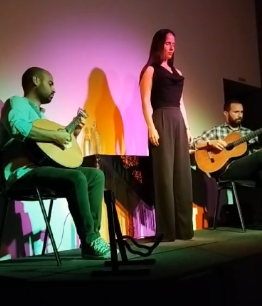On a Wednesday evening in Porto, Portugal, a small audience filled Fado na Baixa, a cozy and popular Fado house. Artists Ana Margarida and Gonçalo Mendes sang in their respective styles of Fado, Fado de Lisboa, and Fado de Coimbra, accompanied by Pedro Martins on the Portuguese guitar and Yuri Reis on the standard guitar.
The female Fadista, Ana Margarida, sang melancholic yet scornful songs in Fado de Lisboa, a more finessed but melancholic and sorrowful style. Gonçalo Mendes, the male Fadista, performed more nostalgic melodies in Fado de Coimbra, a more upbeat and energetic style.
Both Fadistas encouraged their audience to sing with them. Although few could sing along to the songs at first, Ana and Gonçalo taught the audience a little bit of Portuguese for the chorus of each of their songs.
Ana taught the word “errei,” which means “I made a mistake,” and Gonçalo introduced the phrase, “Coimbra tem mais encanto, na hora da despedida,” which means, “Coimbra is more enchanting when it’s time to say goodbye.”
During the finale, they encouraged everyone to sing along with the newly learned phrases.
In between songs, Gonçalo presented the rich history of Fado, from its origins to recent renditions. The presentation included interviews of established Fado singers and Portuguese guitar makers from Coimbra and Lisbon, who explained their journey through this traditional music and how the genre quintessentially makes them proud to be Portuguese.
Fado de Lisboa, the most popular style, best embodies Portuguese culture. Mostly sung by women, it includes tales of sorrow, love or heartbreak.
The sorrowful sound originally came from the separation that lovers, family and friends went through because of long and dangerous sea voyages. Amalia Rodrigues, considered the greatest Fadista of the last century, embodied Portuguese culture throughout her voice and brought Fado de Lisboa to the world.
The second-most-popular style is Fado de Coimbra (or an alternative opening line). Fado de Coimbra is exclusively sung by men and male students to serenade their lovers.
What originally started as an elitist form of music, it has become commonplace in Portugal. In particular, fadistas sing it at the University of Coimbra’s Queima das Fitas (ribbon burning) festival to signify the end of an unforgettable four-year journey.
Even though the experience was only an hour, every part felt magical and had an atmosphere that was simply incredible. Along with the enthusiastic audience and talented artists, I felt as if I was living the songwriter’s life in a Portuguese-themed Wes Anderson film.
Regardless of whether you understand Portuguese or not, people will always understand Fado. In this genre of music, Fado must be understood by the feeling it conveys, not by just listening to it.
Fado, just like any other music genre, is universal.
–Aug. 16, 2023–


